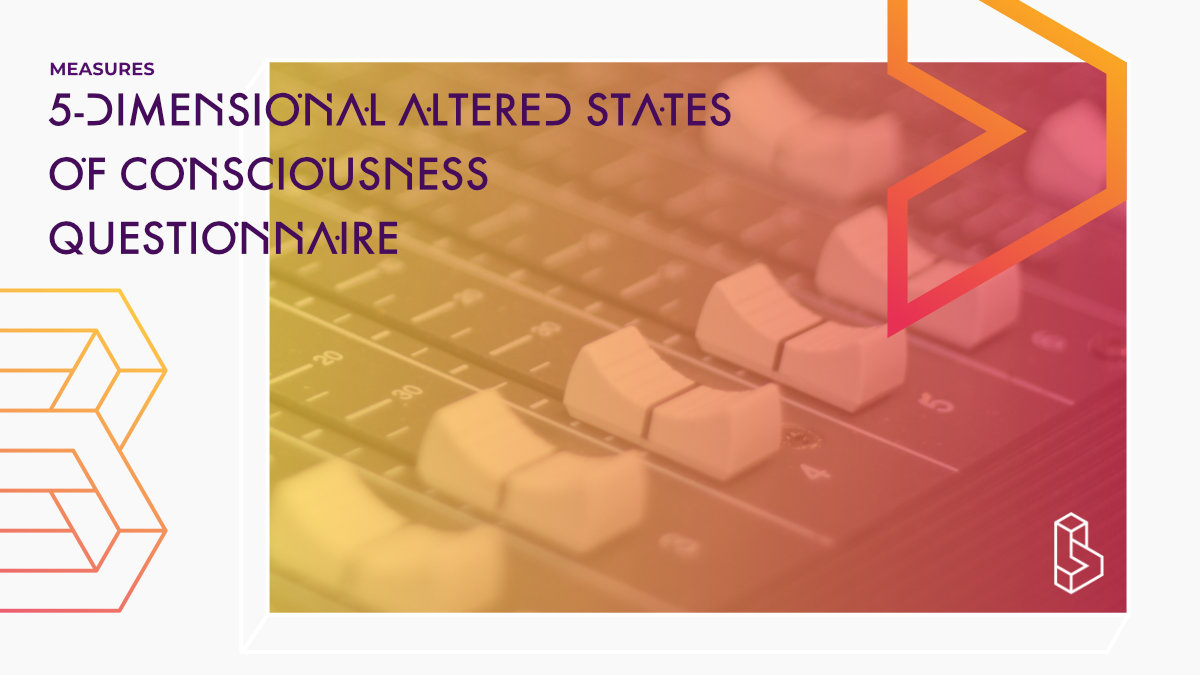The 5-Dimensional Altered States of Consciousness Questionnaire (5D-ASC) scale measures altered states of consciousness and contains 94 items (visual analogue scales). The five overarching dimensions in the scale include; Oceanic Boundlessness, Anxious Ego Dissolution, Visionary Restructuralization, Auditory Alterations and Reduction of Vigilance. Each of these five dimensions contain lower-order scales.
Find out more about 5-Dimensional Altered States of Consciousness Questionnaire
| Alternative name |
|---|
| 5D-ASC |
Active? Yes
First used: 01 January 1970
Related Topic
Healthy SubjectsHealthy subjects or health normals is a term used for those who are currently not suffering from a mental health or substance use disorder. In psychedelic research, the term is often used to describe participants in Phase I or Phase II studies who are testing the safety of a treatment.
Related Papers
Modulatory effect of the 5-HT1A agonist buspirone and the mixed non-hallucinogenic 5-HT1A/2A agonist ergotamine on psilocybin-induced psychedelic experienceThis double-blind, placebo-controlled, randomized, within-subject study (n=36) with four experimental drug conditions, investigated the effects of psilocybin (11.9mg/70kg) in combination with the selective 5-HT1A agonist buspirone (20mg/70kg) and non-hallucinogenic 5-HT2A/1A agonist ergotamine (3mg/70kg), to investigate how the interaction of these serotonin receptor subtypes affect altered states of consciousness. While ergotamine exerted no effect, buspirone selectively inhibited psilocybin-induced visual hallucinations, affective changes, derealization, and depersonalization via activation of 5 -HT1A and/or an interaction between 5-HT1A and 5-HT2A receptors.
The paradoxical psychological effects of lysergic acid diethylamide (LSD)
This double-blind, placebo-controlled study (n=20) found that LSD (75µg) acutely heightened mood and psychosis-like symptoms. At the two-week follow-up, participants reported increased optimism and the trait openness.
Body mass index (BMI) does not predict responses to psilocybin
This pooled analysis (n=77) of body mass index (BMI) data from three psilocybin (25mg) trials finds that BMI doesn't predict the intensity of the response to psilocybin. A fixed-dosing schedule (instead of dosage based on weight which is common for MDMA and ketamine) is probably best going forward in psilocybin-assisted trials.
Related Trials
Effects of SERT Inhibition on the Subjective Response to Psilocybin in Healthy SubjectsThe aim of the study is to investigate the effects of psilocybin after escitalopram and Placebo pretreatment. Subjective and physiological effects as well as effects on gene expression will be assessed.
Evaluating the Feasibility, Safety and Efficacy of Psychotherapy Assisted Psilocybin for Treatment of Severe OCD
The purpose of the current study is to explore new alternative options for the treatment of OCD that can widely and continuously benefit patients. Specifically, the aim of this study is to investigate the feasibility, safety and efficacy of psilocybin-assisted psychotherapy for treatment of severe OCD.
Visual Surround Suppression and Perceptual Expectation Under Psilocybin
The prospective study will address the critical need for more precise characterizations of the acute visual effects of the drug psilocybin by measuring the impact of acute psilocybin intoxication on a perceptual task known as visual surround suppression, compared to an active placebo control.
Psilocybin for the Treatment of Migraine Headache
The purpose of this study is to investigate the effects of oral psilocybin in migraine headache.
Repeat Dosing of Psilocybin in Migraine Headache
In seeking to understand the capacity for psilocybin to reduce migraine headache burden, this study will investigate single and repeated dosing of psilocybin up to two doses.
Role of the Serotonin 5-HT2A Receptor in LSD-induced Altered States of Consciousness (LDR-Study)
The present study explores the role the 5-HT2A receptor in LSD-induced altered states of consciousness using escalating doses of LSD and the 5-HT2A receptor blocker ketanserin administered before a high dose of LSD.
The Effects of MDMA on Prefrontal and Amygdala Activation in PTSD
The Safety and Efficacy of Psilocybin in Cancer Patients With Major Depressive Disorder
This is a Phase II, single-center, fixed dose, open label trial to explore the safety, tolerability and efficacy of a 25mg dose of psilocybin in cancer patients with MDD.
Effects of SERT Inhibition on the Subjective Response to LSD in Healthy Subjects (SERT-LSD)
The aim of the study is to assess whether SERT inhibition reduces expression of the gene coding for the 5-HT2A receptor and the response to LSD.
A Double-blind, Placebo-controlled Study to Evaluate Very Low Dose LSD in Healthy Volunteers Aged 55-75 Years
This study was a Phase I, double-blind, placebo-controlled, randomised study of very low dose LSD.
Clinical, Neurocognitive, and Emotional Effects of Psilocybin in Depressed Patients - Proof of Concept
Effects of serotonin 2A/1A receptor stimulation by psilocybin on mood and emotion processing in major depressive disorder: a randomized double-blind placebo-controlled study
Comparative Acute Effects of LSD, Psilocybin and Mescaline
The LPM-Study compares the acute effects of LSD, psilocybin, mescaline and placebo in a double-blind, placebo-controlled, 4-period cross-over design with four treatment conditions: 1) 100 μg LSD, 2) 20 mg psilocybin, 3) 300 or 500 mg mescaline, and 4) placebo.

